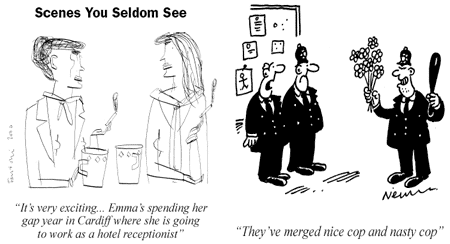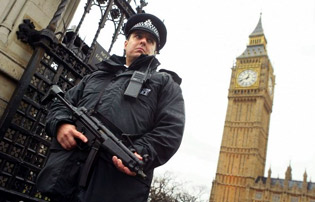
What at first appears to be an innocent and logical move to improve in quality of Policing in England and Wales is upon detailed examination a very politically inspired plan to reorganise the Police into supersized regional services which, in effect, will be centrally controlled from Westminster.
If the proposals as they stand are implemented it will be a truly Orwellian concept; the start of a National Police force (which translates into 'NuLabour' speek as a ' localised regional service')
In later postings my colleague and I will examine, in detail, how the government's proposals will cost at the very least £60 million to implement, remove local accountability, and reduce down the number of officers in the front line.
.

In summary, the proposals would lead to the disappearance of the Cheshire force, one of the oldest and West Mercia, assessed as the best performing in England and Wales. Both oppose the mergers.
The Government's intentions in five other areas, including the South-East, where there is little agreement, and the South-West, where the idea of a vast force stretching from Land's End to Gloucester has been strongly criticised.
The Home Office argues that forces of fewer than 4,000 officers cannot deal effectively with cross-border work against terrorism, drug traffickers, complex murders and other serious crime.
The former Home Secretary, Charles Clark adopted the recommendation of Denis O'Connor, a leading Inspector of Constabulary and former Chief Constable of Surrey, that smaller forces are "not fit for purpose" to deal with such modern policing problems, known as level two crime.
Under the proposals for the West Midlands, the Staffordshire, Warwickshire, West Mercia and West Midlands forces would merge, despite West Mercia's belief that it should stand alone, with an enhanced capacity for dealing with level two criminality.
In the North-East, the Cleveland, Durham and Northumbria forces would combine. Cleveland opposes the move.
In Wales, the Dyfed-Powys, Gwent, North Wales and South Wales forces would merge. There is stiff opposition to the proposals.
In the North-West, Cheshire would merge with Merseyside, despite wishing to stand alone; Cumbria would merge with Lancashire; and Greater Manchester would stay solo.
The planned mergers do not do not include London, though there are proposals in time to merge the 'Met' with the City of London Police.
The Association of Police Authorities has previously
said that the mergers are being pushed through too quickly and will be far more expensive than the Government suggests. It says they will disrupt policing and reduce democratic accountability. In their most extreme form, the mergers could cut the number of forces from 41 outside London to 12.
.
On Monday we will look at the how and why the Police are loosing public confidence and later this week we will post our proposals for alternative structures for the Policing of Her Majesty's realm.







